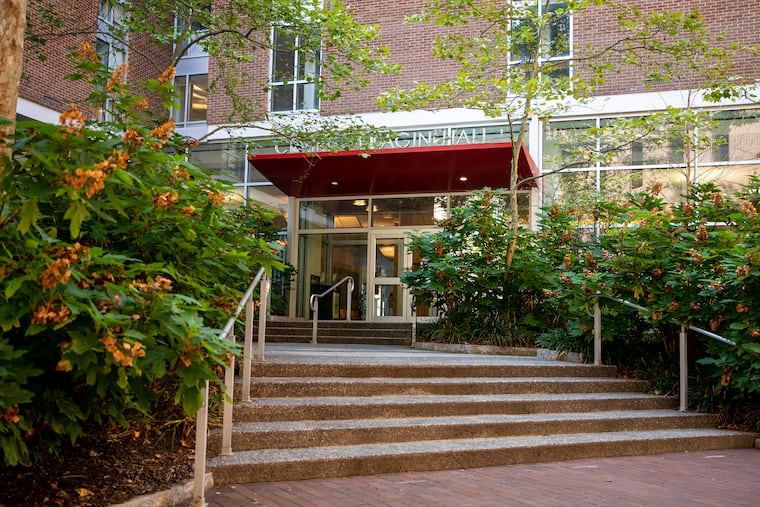Penn Nursing students seek partial refund of tuition, saying virtual clinical training isn’t worth the full cost
Despite the lack in-person simulation and clinical trainings since March 5, tuition and fees have not been reduced.

A group of students at the University of Pennsylvania School of Nursing have published an open letter to administrators outlining what they see as a failure to provide adequate financial and academic support as well as clinical training during the coronavirus pandemic.
As of Tuesday morning, 125 students had signed the Aug. 24 letter, published on WordPress. It calls for issuing each student an itemized bill outlining the costs of clinical training, a refund of all clinical-related fees for summer 2020, and a retroactive 10% reduction of the general fee, in line with what Penn has instituted for the fall semester. The letter also calls for regular meetings between a nursing student working group and administrators to discuss how the School of Nursing can offer more effective academic and financial support.
In the letter, students said that they had been without the resources and instruction comparable to what the School of Nursing, currently ranked by one leading authority as the top nursing school in the world, provides under normal circumstances. Despite the lack of in-person simulation lab training, which allows students to practice their skills in realistic situations, or clinical training since March 5, tuition and fees have not been reduced.
Most of the students who signed the letter are enrolled in the School of Nursing’s accelerated program, which is for people who have a bachelor’s degree in a non-nursing field. The price tag of the program, which lasts for five semesters, is $180,857 including estimated living expenses.
“The alternatives that they offered us were completely less valuable than what we would have gotten if a pandemic were not to have occurred,” said one Penn nursing student who helped write the letter. She asked that her name not be published for fear of hurting her employment prospects after graduating. “We took out a huge investment, and we’re going to be entering the workforce during a global recession. Hospitals are losing money. And the school’s like, ’That’s too bad,’ instead of offering the kind of support we’re paying them for.”
She said that she does not expect Penn to put nursing students in hospitals right now, but being charged for experiences they are not getting is not right.
“I know that we will all be smart, competent nurses in the long run,” she said. “But Penn completely reneged on an agreement.”
The Penn students are not alone. Since campuses in the Philadelphia area closed for the spring semester, college students have launched dozens of petitions seeking refunds and also have filed lawsuits because they were unsatisfied with the quality of virtual classes.
Nursing schools around the country took various approaches to clinical training over the last few months — the University of Maryland, Baltimore allowed nursing students to resume in-person training by the start of summer semester after safety protocols were instituted, while College of the Desert, a public community college in Palm Desert, Calif., decided to suspend nursing courses, causing student protests. Villanova University sent nursing students kits that they could use to showcase their in-person skills to faculty over Zoom, by demonstrating a practice assessment on a family member or a mannequin.
Antonia Villarruel, the dean of Penn Nursing, said in a statement that like many other nursing schools, the school moved to virtual simulation “to be compliant with policies and guidelines set forth by the city and state.”
“While we adapted our teaching methods, they are evidence-based and by no means experimental,” Villarruel said. “Fortunately, we are at a point with the pandemic in our region that we are now able to resume in-person clinicals.”
During the spring semester, students completed clinical hours — which usually involve shadowing a nurse in a hospital — on iHuman, a program that allows users to diagnose virtual patients via drop-down menus. According to the letter, students expressed their concerns about the quality of the program to administrators via email by mid-April, but were told that iHuman had been “thoroughly vetted.”
Over the summer, students were required to watch videos and listen to podcasts “available to the public at no additional cost” for 30 hours of clinical experience. In the letter, students said that listening to the third season of Serial, a popular investigative journalism podcast, fulfilled 10 clinical hours. (Students were told the podcast was supposed to give them a better understanding of the criminal justice system, since the focus of the summer semester was community health.)
Despite meeting multiple times with administrators in the months following the campus shutdown on March 17, students said their concerns about paying full tuition for the virtual training were not addressed.
A student who signed the letter to Penn Nursing said that while it was a “huge bummer” not to be allowed back in clinical training, it made sense. But the school’s lack of recognition that the virtual tools students were given were not of the same caliber was “really disheartening.”
“We’re not unreasonable,” she said. “We have the ability to be understanding of unprecedented times. But as time went on, it became obvious that what was delivered was so lacking in creativity and real thought, it was almost like a smack in the face. I kept wondering if our teachers had actually looked at this. Did they truly feel this was going to make up for what we were losing?”